Managing an online business comes with its fair share of challenges, from handling inventory and processing orders to ensuring smooth shipping workflows and keeping customers engaged. The good news is that the right eCommerce tools can significantly simplify your daily routines, save valuable time, and let you focus on what matters most — growing your business. In this post, we’ll explore the best eCommerce tools to help your online venture thrive in 2025.
Disclaimer: The information in this post is accurate as of December 2024.
eCommerce tools are software solutions for effectively managing and growing online businesses. They cater to various eCommerce business needs, such as inventory management, customer engagement, and performance tracking. While specific features may vary across platforms, the core purpose of all eCommerce tools is to enhance overall performance and drive business growth.
Businesses rely on tools for eCommerce to efficiently manage their online operations, stay competitive, and meet growing consumer demands. Here’s a closer look at why eCommerce tools are essential:
- Simplify business operations. The right software can help businesses streamline routine workflows, such as order processing or inventory updates. For instance, automation platforms can handle repetitive tasks, while CRM systems organize customer interactions and oversee store management.
- Improve efficiency. Tools for eCommerce accelerate tasks like processing payments, generating invoices, and managing customer inquiries. They also ensure seamless coordination across departments.
- Enhance the customer experience. eCommerce tools allow businesses to provide timely communication and personalized recommendations to improve overall customer satisfaction.
- Enable data-driven decisions. Using different platforms for your online business, you can easily track sales, customer behavior, and website performance to make informed decisions.
- Support business growth. Scalable eCommerce solutions can help businesses effortlessly accommodate increased orders, products, and traffic. Many tools also offer features like currency converters and multilingual support, which allow businesses to target international customers without significantly changing their workflows.
- Stay competitive. By adopting cutting-edge AI tools for eCommerce with regular integrations and updates, businesses can stay ahead of the curve.
With the right tools for eCommerce, businesses can simplify their operations and create a smoother, more enjoyable shopping experience for customers. This not only boosts efficiency but also builds customer satisfaction and supports long-term growth.
The market offers a wide range of tools for eCommerce, each designed to meet specific business needs. Let’s now explore the most common types of eCommerce tools and how they can support your online business.
eCommerce platforms
Choosing the right eCommerce platform is typically the first step to building a successful online store. These platforms are a kind of one-stop shop for creating product listings, managing inventory, processing orders, and handling payments. Most platforms also let you customize your store’s design, organize products, and run promotions.
With features like integrated shopping carts and secure checkout options, eCommerce platforms can really simplify online business management and growth.
Website builders
While many eCommerce platforms include built-in design tools, a separate website builder might be necessary for businesses that need advanced customization to align with their specific branding or design goals. Dedicated website builders offer greater control over design and layout, making them ideal for creating unique storefronts.
Additionally, if you need extra features like membership areas or subscription forms, you may need additional eCommerce tools or integrations.
Design tools
Visual content is essential for attracting potential customers and establishing your brand identity online. Design tools can help you create everything from product images and social media posts to presentations and promotional materials.
With templates and drag-and-drop features, such eCommerce tools can help you make your visuals professional and consistent, which is perfect for businesses that prioritize social media marketing.
CRM tools
CRM tools help businesses manage customer interactions, track leads, and personalize communication to build stronger relationships and improve retention. Some CRM tools for eCommerce also integrate with popular messaging platforms, such as Telegram or WhatsApp, allowing you to communicate with your customers across different channels from a single interface.
Shipping and fulfillment tools
If your business sells physical products, logistics tools are crucial to streamline your operations. These platforms help manage the entire shipping process, from label creation and package tracking to fulfillment and delivery. They often integrate with multiple carriers, which allows you to choose the best option and deliver products efficiently to different regions.
Email marketing tools
Email marketing remains one of the most effective and affordable ways to connect with customers. The right email automation tools make it simple to create and send engaging campaigns that can promote your products, boost sales, and keep your audience interested. Numerous tools are available, catering to both non-technical teams and more tech-savvy users.
Many of these tools for eCommerce include features like automation to save time and analytics to show how your emails are performing so you can keep improving with every send.
SEO tools
Implementing effective SEO strategies for your product pages and blog is crucial for attracting the right audience online. These eCommerce tools help businesses optimize their websites for search engines, track keyword rankings, and enhance on-page SEO to drive organic traffic. There are many SEO tools available, including those that allow you to search for keywords by country, language, and other criteria.
Analytics and reporting platforms
While eCommerce platforms often include basic analytics, dedicated eCommerce analytics tools offer more detailed insights. They provide valuable information about website performance, customer behavior, and sales trends, helping businesses optimize their online store.
You may also come across other types of eCommerce tools, such as affiliate marketing platforms, review and testimonial tools, and live chat or customer support solutions. However, many eCommerce platforms already offer these features or integrations, reducing the need for separate tools.
All-in-one eCommerce tools combine features like CRM, marketing automation, and analytics into a single solution, making it easier to manage and scale your online store. Here’s a closer look at the top platforms.
SendPulse
SendPulse is a powerful all-in-one marketing and sales automation platform and an extremely valuable tool for eCommerce businesses. Its standout multichannel marketing approach allows businesses to manage email campaigns, bulk SMS, chatbots, websites, web push notifications, and more from a single, user-friendly dashboard.
The platform also features a built-in CRM system, enabling seamless customer data collection and management. Additionally, detailed real-time analytics provided by this solution help track website performance and business metrics, making it easier to achieve your goals.
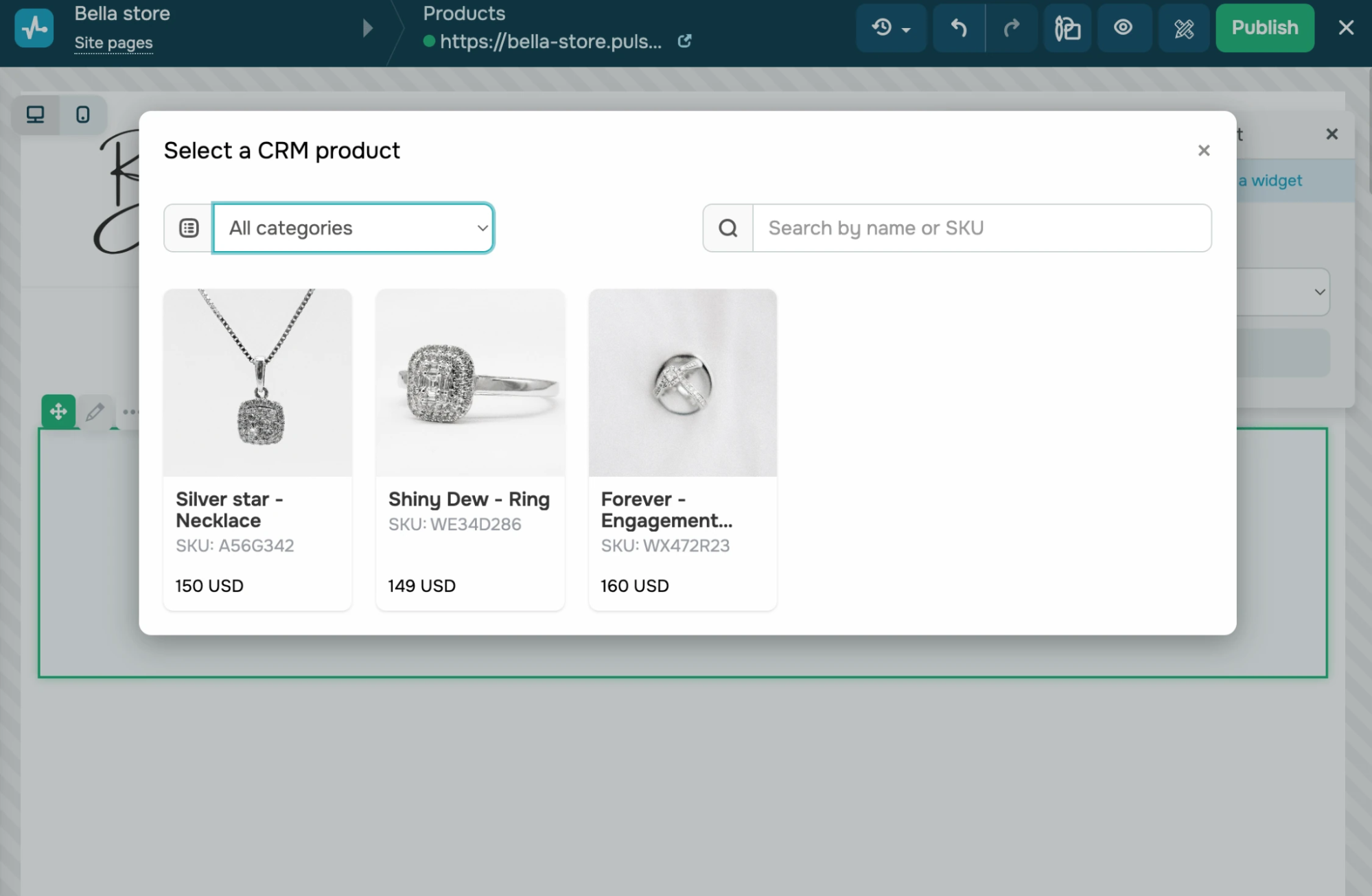 Adding products to an online store created with SendPulse
Adding products to an online store created with SendPulse
The platform’s key features include:
- website builder with eCommerce features and integrations;
- built-in CRM system for managing products, payments, and customer relationships;
- intuitive email campaign builder;
- detailed audience segmentation by gender, location, or interests;
- multichannel marketing tools;
- web push notifications and SMS campaigns;
- ready-made and custom automated flows;
- eCommerce pop-ups;
- survey and NPS tools;
- chatbots for WhatsApp, Facebook Messenger, Telegram, and other platforms;
- SEO and analytics tools.
Pricing. SendPulse offers flexible pricing plans tailored to different eCommerce needs, including email marketing, CRM system, and chatbots. Each category includes a free plan along with various paid options. For example, the free email marketing plan supports up to 500 subscribers and allows 15,000 emails. Paid plans start at around $8/month, depending on your contact count. You can also customize a plan by selecting only the features you need.
Shopify
Shopify is one of the most prominent eCommerce tools for building and managing online stores. It caters to businesses of all sizes, offering everything from customizable website templates to tools for selling across multiple channels, including social media, marketplaces, and physical locations. Its flexibility also makes it ideal for B2B businesses, allowing seamless management of wholesale and direct-to-consumer operations on a single platform.
 Getting started with Shopify; source: YouTube
Getting started with Shopify; source: YouTube
The platform’s key features include:
- feature-rich online store builder;
- a variety of customizable templates and themes;
- multiple sales channels, including social media and online marketplaces;
- customer segmentation;
- email marketing automation capabilities;
- automated translations for international stores;
- lead capture forms;
- tools for in-person selling at pop-ups and markets;
- abandoned cart recovery;
- over 60 reports for performance tracking and optimization;
- extensive third-party app integrations.
Pricing. Shopify doesn’t offer a free plan but provides a free trial and a $1 starter plan for the first month. Afterward, pricing starts at $29/month (billed yearly), including features like a fully customizable online store, unlimited product listings, and multi-channel selling tools.
Squarespace
Squarespace is primarily known as a website-building and hosting platform designed to help businesses create professional-looking websites without technical expertise. This eCommerce tool offers an all-in-one solution, combining customizable website templates, integrated hosting, and tools for managing content, eCommerce, blogging, and more.
 Adding products to an online store in Squarespace; source: YouTube
Adding products to an online store in Squarespace; source: YouTube
The platform’s key features include:
- intuitive, customizable website templates;
- AI-powered tools, including design suggestions and product descriptions;
- flexible shipping options, such as flat-rate, weight-based, and real-time shipping rates;
- built-in tax calculation tools;
- integrated SEO tools;
- capabilities to sell online and in person;
- email campaign manager with seamless transitions from website content;
- email personalization and automation;
- promotional pop-ups and banners;
- integrated analytics.
Pricing. While Squarespace doesn’t offer a free plan, it provides a 14-day free trial so you can explore its features. Paid plans start at $16/month (billed annually) and include access for 2 website contributors and essential tools for building a website. For fully integrated eCommerce features, you’ll need a higher-tier plan.
BigCommerce
BigCommerce is a cloud-based eCommerce tool designed to help businesses of all sizes build and manage their online stores. This platform provides everything you need to create a fully customizable online store, optimize the checkout process, and expand your sales channels to marketplaces and social media platforms, making it suitable for both startups and large enterprises.
 Adding a new product in BigCommerce; source: BigCommerce
Adding a new product in BigCommerce; source: BigCommerce
The platform’s key features include:
- mobile-responsive website designs;
- built-in image optimization;
- support for coupons, discounts, and gift cards;
- payment processing in over 100 currencies;
- single-page checkout;
- real-time shipping quotes;
- customer segmentation and group management;
- abandoned cart recovery;
- advanced product filtering options;
- seamless integrations with major marketplaces like Amazon, Walmart, eBay, and Target+.
- detailed analytics tools, including sales, orders, sales conversion rates, cart abandonment, and more.
Pricing. BigCommerce doesn’t offer a free plan, but you can explore its features with a 15-day free trial. Paid plans start at $29/month (billed annually) and include up to 3 storefronts, annual online sales of up to $50,000, and access to all essential eCommerce tools.
Email marketing is vital for eCommerce businesses as it enables businesses to connect directly with customers and drive conversions. Below is an overview of one of the best email marketing platforms for eCommerce to help you find the right fit for your business.
Klaviyo
Klaviyo is an established tool for eCommerce designed to enhance customer communication with a range of powerful features. Its marketing automation platform allows you to streamline workflows across multiple channels easily. While its primary focus is email campaigns, Klaviyo also allows businesses to run SMS campaigns, send push notifications, and collect reviews for social proof.
 Crafting an email in Klaviyo; source: Klaviyo
Crafting an email in Klaviyo; source: Klaviyo
The platform’s key features include:
- automated email, SMS, and push notification flows;
- omnichannel campaigns;
- web forms, such as eCommerce pop-ups, fly-outs, embedded forms, and multi-step forms;
- centralized customer data, including customer profiles;
- AI tools for complex segmentation;
- show/hide logic for specific segments;
- custom HTML/CSS support;
- A/B testing;
- AI features for predictive analytics;
- RFM analysis;
- reporting across email, SMS, and mobile push data.
Pricing. Klaviyo’s pricing depends primarily on the number of active profiles. Its free plan includes up to 500 monthly email sends. The lowest-paid plan for email marketing starts at $20/month for 500 profiles, enabling you to send up to 5,000 monthly emails.
Omnisend
Omnisend is a robust eCommerce tool designed to help businesses create personalized marketing campaigns. You can easily craft engaging email campaigns using pre-designed templates or a user-friendly drag-and-drop editor. Omnisend leverages customer profile data and shopping history to segment audiences based on their interests, ensuring targeted communication. In addition to emails, Omnisend supports SMS and push notification campaigns, providing a comprehensive solution for multi-channel marketing.
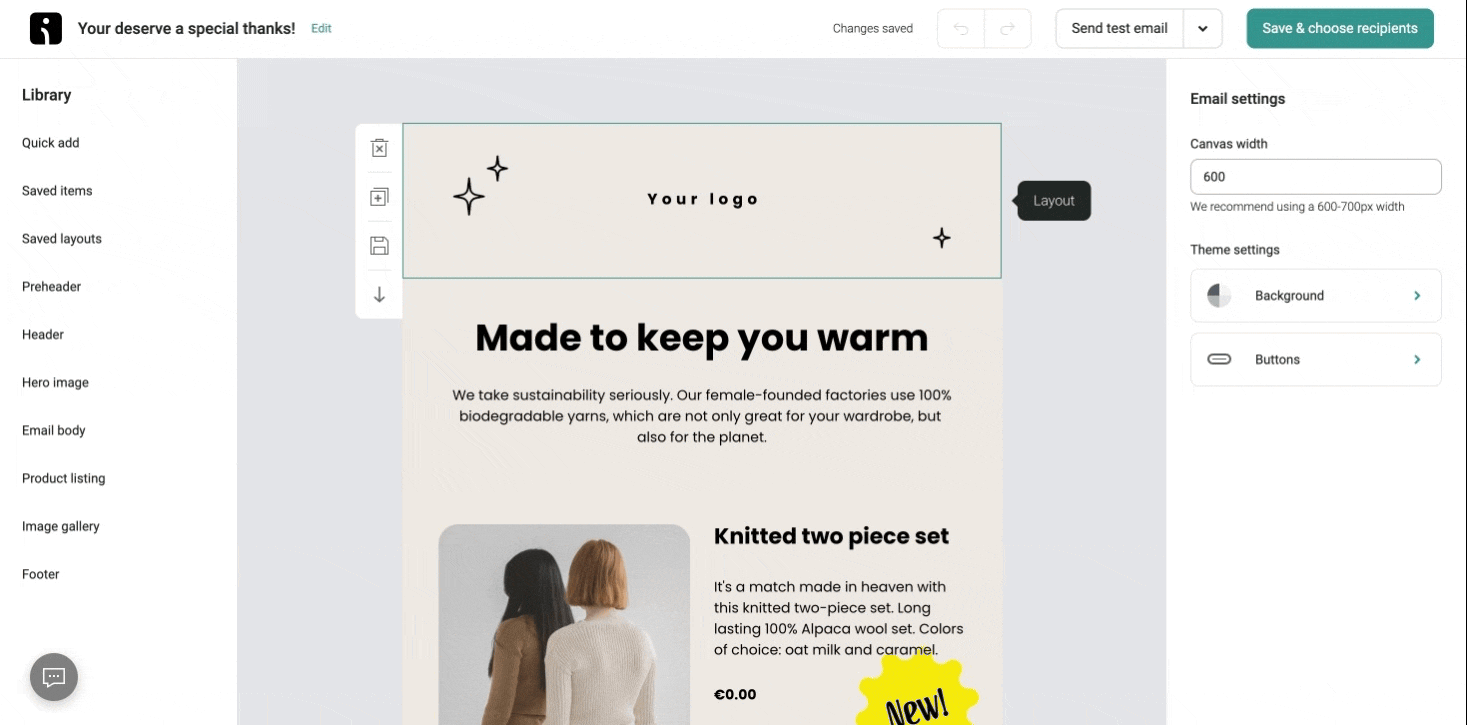 Building an email in Omnisend; source: Omnisend
Building an email in Omnisend; source: Omnisend
The platform’s key features include:
- drag-and-drop email builder;
- image editor;
- email templates;
- product content blocks;
- AI writing assistant;
- conditional content blocks for the target audience;
- pre-built eCommerce flows, such as cart abandonment, welcome series, etc.;
- email, SMS, and push notification automation;
- segmentation based on customer data and lifecycle stages;
- advanced reporting, including segment reports, campaign clickmaps, and more.
Pricing. Omnisend provides a free plan that supports up to 250 contacts and 500 emails/month. For those needing more, the cheapest paid plan starts at $16/month, offering 500 contacts and 6,000 emails monthly. Most features are available across all plans.
Mailchimp
Mailchimp is a widely-used email marketing platform known for its robust features. It allows businesses to create personalized email campaigns and effectively target audiences using behavior-based automation and segmentation. With its AI tools for eCommerce, Mailchimp simplifies the process of crafting subject lines and email content. It also provides dynamic product recommendations and design enhancements.
 Setting up an email campaign in Mailchimp; source: YouTube
Setting up an email campaign in Mailchimp; source: YouTube
The platform’s key features include:
- 100+ pre-built email templates;
- automated customer journeys;
- generative AI features;
- custom-coded email templates;
- dynamic email content for different audience segments;
- advanced segmentation based on unlimited conditions;
- behavioral targeting;
- email scheduling;
- A/B testing;
- comparative reporting.
Pricing. Mailchimp provides a free plan that supports up to 500 contacts, allowing you to send 1,000 emails/month or 500 emails/day. For additional capacity, the cheapest paid plan starts at $13/month, which includes 500 contacts and up to 5,000 emails/month.
The eCommerce CRM tools help businesses manage customer relationships, automate follow-ups, and personalize interactions. Below, you’ll find the top platforms for customer relationship management.
HubSpot
HubSpot is a robust CRM platform that helps businesses streamline customer interactions and drive growth. It provides a real-time, visual dashboard of the entire sales pipeline, enabling teams to follow up at the right time through live chat, email, or calls. In addition to its CRM features, this tool for eCommerce offers an integrated suite of tools for marketing, sales, customer service, and content management, making it a comprehensive solution for business needs.
 Creating contacts in HubSpot CRM
Creating contacts in HubSpot CRM
The platform’s key features include:
- visual dashboard;
- detailed sales reports that cover activity, productivity, and individual performance;
- deal pipelines;
- drag-and-drop editor for creating custom pipelines;
- email engagement and tracking notifications;
- email templates and scheduling;
- live chats and conversational eCommerce chatbots;
- CRM imports and exports;
- list segmentation;
- Breeze Copilot for lead insights and task automation.
Pricing. HubSpot offers its CRM tools for free, supporting up to 1,000 contacts. For advanced features, the Sales Hub plan starts at $15/month per user seat and includes 1,000 marketing contacts.
Streak CRM
Streak CRM is an eCommerce tool built to work seamlessly within Google Workspace. Integrated directly into Gmail, it automatically captures data from emails and contacts, making it easy for businesses to manage sales pipelines, customer relationships, and team collaboration, all from their inbox. It also enables automatic sharing of emails, notes, and call logs with team members for smoother collaboration across teams.
The platform’s key features include:
- private and shared sales pipelines;
- view tracking;
- mass email personalization;
- email scheduling;
- snippets for commonly written emails;
- thread splitter for emails;
- Google Workspace integrations, such as Gmail, Calendar, Drive, Sheets, and Chat;
- basic CRM features, including call logs, custom fields, and more;
- advanced CRM features, such as enriched contacts and native dialer support;
- AI features for deal summaries, autofill, and others;
- automations for tasks, comments, and workflow management.
Pricing. Streak CRM offers a free plan with essential features like email tracking, link tracking, snippets, and up to 50 daily mail merges. Paid plans start at $49/month (billed annually), including 1,500 email merges, advanced CRM tools, and shared pipelines.
Pipedrive
Pipedrive is a CRM platform known for its intuitive, visually driven interface. Designed to streamline sales processes, it offers features like automated conversations and AI-powered prompts to help you prioritize the most promising leads. This eCommerce tool delivers real-time sales reports and actionable insights into your sales funnel, with AI-driven suggestions to refine your strategy. Additionally, Pipedrive includes tools for forecasting, goal-setting, and team performance monitoring.
 Organizing user data in Pipedrive; source: Pipedrive
Organizing user data in Pipedrive; source: Pipedrive
The platform’s key features include:
- lead, calendar, and pipeline management;
- customizable pipelines;
- group emailing;
- custom fields;
- sales suggestions based on performance;
- automations triggered by time lapses or predefined conditions;
- AI tools like marketplace search and email summarization;
- visual dashboard;
- open and click tracking;
- activity, deal, and contact reports;
- revenue forecast reports.
Pricing. Pipedrive doesn’t offer a free plan, but a free trial lets you explore its features. Paid plans start at $14/month (billed annually) and include 3,000 open deals, 30 custom fields per company, and 15 reports per user. Higher-tier plans offer more advanced features with fewer limitations, and add-ons are available to enhance your existing plan.
The best eCommerce tools for content creation
High-quality visuals make it easier to attract new customers, enhance brand recognition, and drive conversions across multiple platforms. Let’s explore some helpful content creation tools available in the market.
Canva
Canva is a versatile design tool that simplifies creating graphics for social media posts, presentations, logos, and more. Its drag-and-drop interface makes it easy for users of all skill levels to design professional-looking visuals. The platform also offers a vast library of ready-made templates tailored to various social media formats, organized by topic for quick navigation.
 Creating a social media post in Canva
Creating a social media post in Canva
The platform’s key features include:
- drag-and-drop content builder;
- library with ready-to-use templates;
- video and photo editing tools;
- website builder;
- AI-generated writing and designs;
- stock photos and graphics;
- collaboration feature.
Pricing. Canva follows a freemium model. The free plan provides access to over 2 million templates, AI design tools, and more. The basic paid plan starts at $10/month per user (billed annually) and includes advanced features like exporting print-ready designs and applying your brand voice.
Lumen5
Lumen5 is an AI tool for eCommerce that allows businesses to generate video content from text prompts, photos, blog articles, or existing videos. This can be helpful for businesses that are seeking to create videos of their products or services for their website or social media without investing in professional production. The platform features a drag-and-drop editor alongside a library of customizable templates, preset text, styles, and color schemes.
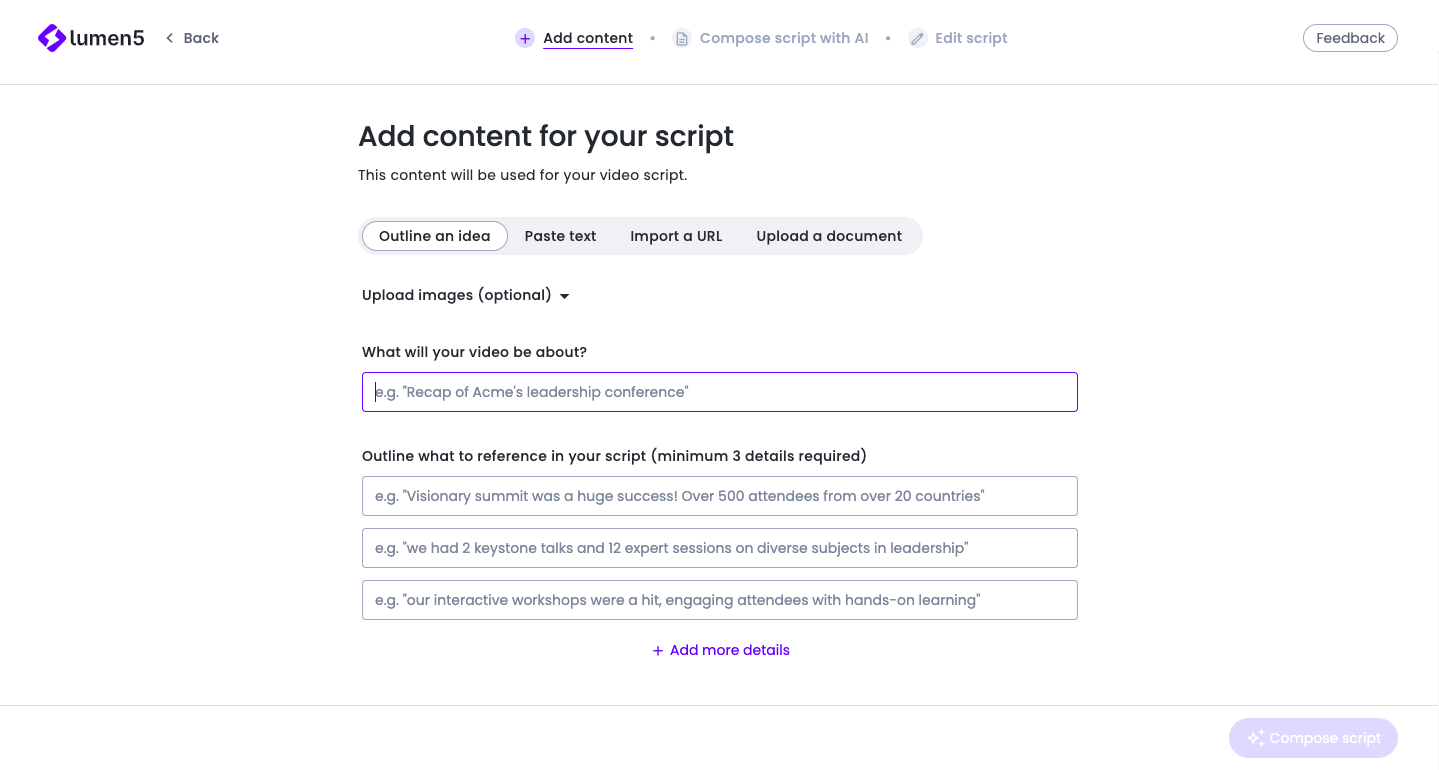 Writing content for a video script in Lumen5
Writing content for a video script in Lumen5
The platform’s key features include:
- 30+ templates of scenes and animations;
- custom templates, fonts, icons, and colors;
- AI voice library;
- automated captions;
- talking head videos;
- blogs to videos feature;
- AI script composer;
- library of license-free visuals.
Pricing. Lumen5 offers a free plan that includes the Lumen5 watermark and allows you to create up to 5 videos monthly. The platform’s cheapest paid plan costs $19/month when billed annually, and allows you to create unlimited videos. It also grants access to advanced features like the AI script composer.
Figma
Figma is a collaborative design and prototyping tool that’s popular for creating web and social media designs. Unlike traditional design software, Figma operates directly in your browser, making real-time collaboration with team members easy and efficient. It offers advanced features like code translation for designs, co-creating presentations, and more.
 Creating a website layout in Figma
Creating a website layout in Figma
The platform’s key features include:
- Figma editor;
- advanced drawing tools for web design;
- CSS, iOS, and Android code snippets;
- a set of collaboration tools;
- interactive prototypes;
- live embeds;
- AI features for mockup generation, text rewriting, content generation, etc.;
- third-party integrations.
Pricing. Figma offers a free plan that includes all main tools in the Figma editor and 3 collaborative design files. The cheapest paid plan costs $15/month per user and offers unlimited collaborative files, advanced prototyping, dev mode, and more.
According to Business Dasher, 74% of consumers rely on social media to guide their purchasing decisions. To help you stay ahead, here’s a look at the top eCommerce tools that can simplify social media management and boost your online presence.
Buffer
Buffer is an eCommerce tool designed to help small businesses grow their organic online audience. It allows businesses to share content across multiple social media channels and recommends hashtags to boost post visibility. Additionally, Buffer provides collaboration tools that eliminate the need for micromanagement, streamlining team workflows.
 Scheduling a social media post in Buffer; source: YouTube
Scheduling a social media post in Buffer; source: YouTube
The platform’s key features include:
- planning and publishing tools;
- support for various social media channels, including Instagram, YouTube, X, Threads, and more;
- AI assistant for repurposing existing content and generating new posts;
- integration with Canva, Dropbox, etc.;
- content scheduling;
- custom video thumbnails;
- performance overview;
- custom reports.
Pricing. Buffer offers a free plan that allows you to connect 3 channels and schedule up to 10 posts per channel. The paid plan starts at $5/month per channel and includes unlimited post scheduling. You can try the paid plan with a 14-day free trial.
Hootsuite
Hootsuite is a social media management platform designed to help businesses manage multiple social media accounts in one place. This eCommerce tool allows users to schedule posts, monitor engagement, track analytics, and collaborate with team members. Hootsuite supports a wide range of social media platforms, including Facebook, Twitter, Instagram, LinkedIn, TikTok, and YouTube.
 Scheduling content in Hootsuite; source: Hootsuite
Scheduling content in Hootsuite; source: Hootsuite
The platform’s key features include:
- multi-profile post scheduling;
- best time to post recommendations;
- AI caption, hashtags, and ideas generation;
- one inbox for all social media accounts;
- bulk scheduling;
- social media ad campaign management;
- performance tracking by goal;
- paid and organic ROI reporting.
Pricing. Hootsuite doesn’t offer a free plan, but a 30-day free trial is available. The cheapest paid plan starts at $105/month (billed annually) and includes 1 user seat and 10 social accounts.
Sprout Social
Sprout Social is a social media management platform that helps businesses and organizations streamline their social media strategy. This tool for eCommerce offers capabilities for scheduling, publishing, monitoring, and analyzing social media content across various platforms, as well as managing influencer marketing in one place.
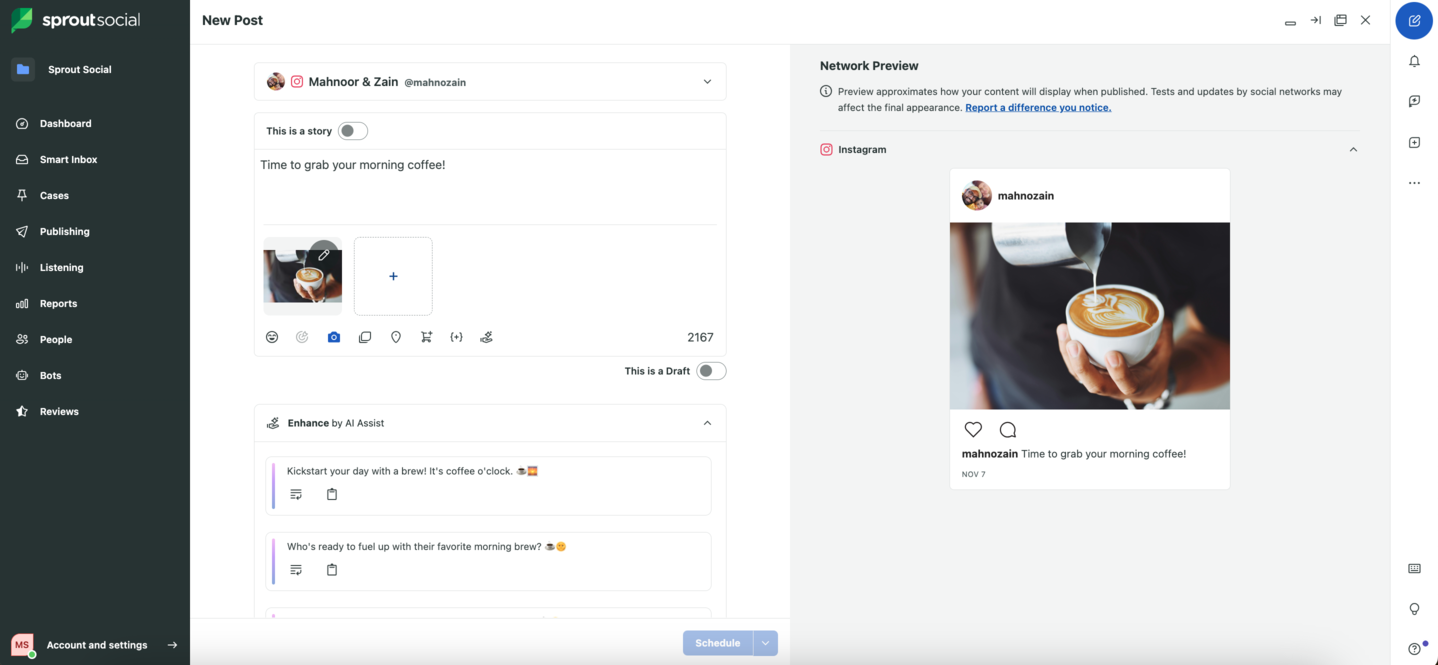 Creating an Instagram post in Sprout Social; source: Sprout Social
Creating an Instagram post in Sprout Social; source: Sprout Social
The platform’s key features include:
- support for social profiles, including TikTok, WhatsApp, LinkedIn, Glassdoor, and more;
- all-in-one social inbox;
- Facebook and Instagram ads comment moderation;
- custom influencer list;
- influencer marketing campaign management;
- automated conversational workflow;
- advanced post scheduler;
- CSAT and NPS surveys;
- paid promotion for Facebook and Instagram;
- Google Analytics report;
- engagement reporting.
Pricing. Sprout Social doesn’t have a free plan, but you can start with a 30-day free trial. The platform’s cheapest paid plan costs $199/month per seat, and includes 5 social profiles, keyword and location monitoring, reporting, and other useful features.
Regardless of your industry and target audience, SEO optimization should be an integral part of any eCommerce business. Below, you can find the top tools that can help you get discovered online.
Semrush
Semrush is a comprehensive eCommerce tool that helps businesses and marketers boost online visibility and drive growth. It offers a wide range of features for SEO, content marketing, pay-per-click advertising, social media management, and competitive research.
 Backlink audit in Semrush; source: Semrush
Backlink audit in Semrush; source: Semrush
The platform’s key features include:
- keyword research;
- on-page SEO optimization;
- competitor analysis;
- local SEO tools;
- content marketing tools, including a SEO writing assistant and SEO friendly content;
- paid ads management;
- website monetization tools;
- market analysis;
- backlink analysis tools.
Pricing. Semrush doesn’t provide a free plan. Its cheapest paid plan starts at $117.33/month when billed annually, and includes 5 projects, 500 keywords to track, and 10,000 results per report.
Ahrefs
Ahrefs is a powerful digital marketing toolset that helps businesses streamline their SEO efforts. This tool for eCommerce offers a detailed SEO dashboard that provides an overview of all your projects and tracks their SEO performance and progress. Additionally, Ahrefs allows you to discover top-performing content in your niche and identify thousands of link-building opportunities.
 Project dashboard overview; source: Ahrefs
Project dashboard overview; source: Ahrefs
The platform’s key features include:
- SEO dashboard;
- performance tracking across multiple URLs;
- organic traffic and keyword research;
- competitor backlink analysis;
- AI keyword generator;
- keyword groups by parent topic;
- complete SEO website audit;
- keyword rank tracking on desktop and mobile across 190 countries;
- finding low-competition topics;
- identification of top-performing content in different niches.
Pricing. Ahrefs doesn’t offer a free plan. The cheapest paid plan starts at $125/month (billed annually) and includes 1 user seat, 5 projects, 500 credits per user, and 750 tracked keywords. You can also add 2 extra user seats to this plan.
Moz
Moz is a comprehensive SEO reporting tool that helps businesses monitor and improve their website’s organic search performance. This eCommerce tool offers various solutions tailored to different needs. Moz Pro offers advanced SEO tools, while Moz Local is designed for managing and optimizing local business listings. Moz also offers a variety of free tools, including the Domain Authority Checker and Keyword Explorer.
 Keyword suggestions in Moz; source: Moz
Keyword suggestions in Moz; source: Moz
The platform’s key features include:
- quality keyword discovery;
- AI domain overview and keyword suggestions;
- content recommendations based on target keywords;
- search intent insights to understand your audience better;
- identification of SEO improvement opportunities;
- rank tracker across multiple search engines;
- competitive research.
Pricing. Moz doesn’t offer a free plan, but you can start with a 30-day free trial. The cheapest paid plan costs $31/month (billed annually) and includes 1 user seat, 1 tracked site, 50 tracked keywords, and 20,000 pages crawled per month.
The right eCommerce tools for logistics are crucial because they streamline and enhance the delivery process, ensuring a smooth and satisfying experience for both businesses and customers. Here’s a closer look at some comprehensive platforms.
ShipStation
ShipStation is a cloud-based software that streamlines shipping and order management for businesses. Beyond basic shipping, it offers tools for omnichannel management, inventory and warehouse tracking, processing returns, and generating reports. With over 180 integrations, ShipStation connects to major carriers like UPS, USPS, FedEx, DHL Express, and GlobalPost, making it a versatile solution for managing logistics.
The platform’s key features include:
- importing orders from 100+ platforms, including marketplaces and ERPs;
- scan-based workflows and bulk updates;
- printing labels individually or in batches of up to 500;
- instant tracking information updates;
- custom emails, branded tracking pages, and returns portals;
- multi-package and split shipment support;
- multi-channel shipping and product analytics;
- end-of-day forms and carrier pickup scheduling;
- integration with multiple partners, including SendPulse.
Pricing. ShipStation does not offer a free plan, but it provides a free trial to get you started. The platform’s basic plan costs $9.99/month, including 50 monthly shipments and 1 user seat. Higher-tier plans provide increased shipment limits and additional features like branded tracking pages and labels.
Shippo
Shippo is another eCommerce tool designed to streamline shipping for businesses. Available as both an app and an API, it integrates with over 40 global carriers and major store platforms, making it easy to get started with minimal setup. You can simply connect your store to manage and print labels for all your orders in one place.
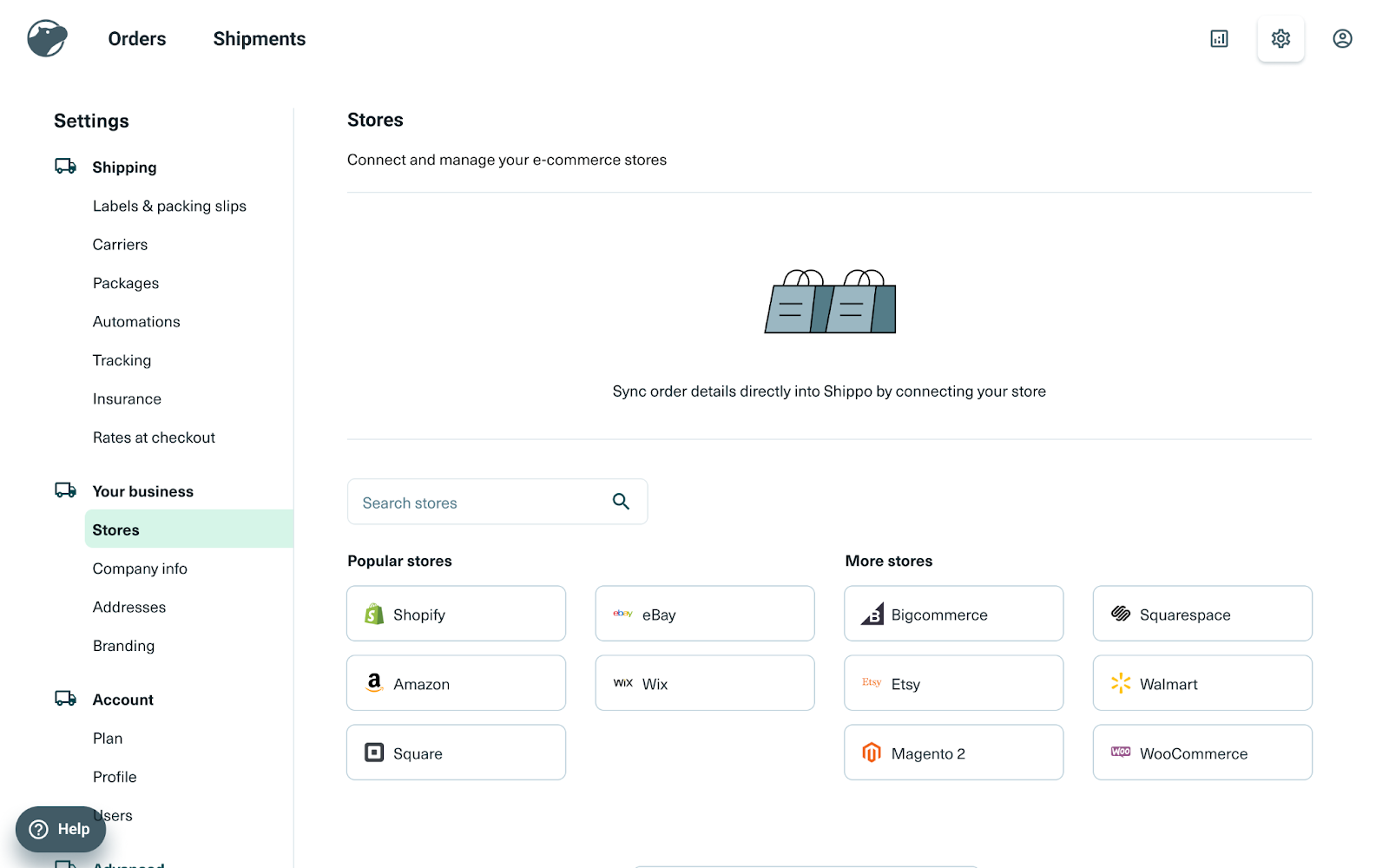 Connecting an eCommerce store to Shippo; source: Shippo
Connecting an eCommerce store to Shippo; source: Shippo
The platform’s key features include:
- 40+ global carriers;
- high-volume shipping optimization;
- automations for setting up shipping rules and creating labels faster;
- customs forms and commercial invoices for international shipments;
- bulk label purchase;
- pickup scheduling with USPS and DHL Express;
- branded tracking packages, notification emails, and packaging slips;
- return labels;
- analytics and reporting.
Pricing. Shippo offers a free plan that includes 1 user seat and allows you to create up to 30 labels monthly. The platform’s cheapest plan starts at $19/month that includes up to 5 users and 200 labels.
Easyship
Easyship is a shipping platform that simplifies global shipping for eCommerce businesses. You can easily integrate it with your store or marketplace without coding. With customizable shipping rules, Easyship helps automate your workflows, saving time and eliminating repetitive decisions. It also offers a set of free shipping tools, including a shipping calculator and policy generator.
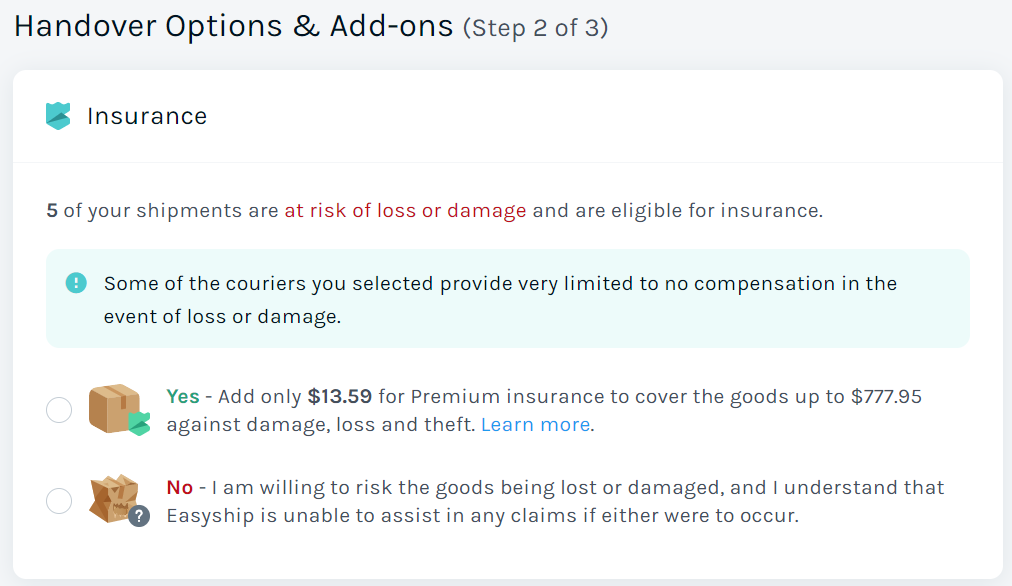 Setting up insurance and handover options; source: Easyship
Setting up insurance and handover options; source: Easyship
The platform’s key features include:
- intelligent courier selection algorithm;
- courier pickup or drop-off scheduling
- return labels generation;
- import tax and duty calculation;
- thermal label printing;
- batch label printing;
- smart packaging selection algorithm;
- auto sync orders from platforms;
- integrations with eCommerce and marketplace platforms.
Pricing. This tool for eCommerce has a free plan that allows businesses to fulfill up to 50 monthly shipments. The platform’s cheapest paid plan starts at $23/month, when billed annually, and enables up to 500 monthly shipments and additional features.
Analytics and reporting tools are crucial for eCommerce businesses to optimize performance and maintain a competitive edge. Below, we highlight the top software tools, each specializing in different aspects of analytics.
Kissmetrics
Kissmetrics is an eCommerce analytics tool designed to track user behavior and provide insights into customer acquisition, retention, and overall experience. What sets it apart from other analytics platforms is its focus on monitoring individual user activity over time, giving you a comprehensive view of customer journeys. It also offers advanced features like multi-channel attribution and funnel visualization, helping you understand how customers interact with your brand across different touchpoints.
The platform’s key features include:
- multi-channel attribution;
- A/B tests for different flows and designs;
- behavioral analytics;
- funnel visualization;
- linking customer actions to specific campaigns;
- population reports;
- activity and path reports;
- integration with CRM systems, email marketing tools, and eCommerce software.
Pricing. Kissmetrics doesn’t offer a free plan. The platform’s basic paid plan starts at $299/month, and includes up to 2 million tracked events, 3 user seats, and 10 populations. Larger plans are available for teams with additional features and higher tracking limits.
Hotjar
Hotjar is a web analytics and feedback platform designed to help businesses understand how users interact with their websites or digital products. This eCommerce analytics tool provides a visual way to optimize conversion rates, and address usability issues with the help of heat maps, screen recordings, and surveys.
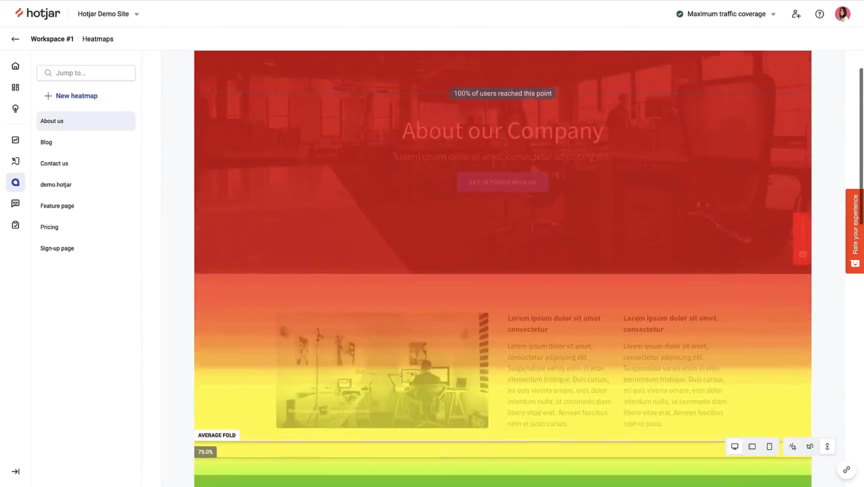 A heatmap of a website
A heatmap of a website
The platform’s key features include:
- heatmaps with insights on user clicks, moves, scrolls, etc.;
- playbacks of user sessions, including mouse movements, u-turns, and more;
- customer feedback forms;
- survey builder;
- multiple integrations with eCommerce tools;
- funnels for user behavior analysis;
- granular filters;
- insights personalization by events, and user attributes.
Pricing. Hotjar offers a free plan that lets you track up to 35 daily sessions, use basic filters, and unlimited heatmaps. The cheapest paid plan starts at $33/month, providing up to 100 daily sessions along with enhanced insights, advanced session information, page view filters, and more.
Mixpanel
Mixpanel is a powerful product analytics platform designed to help businesses track and analyze user interactions with their digital products, such as websites and mobile apps. It is a comprehensive eCommerce analytics tool that combines qualitative and quantitative data into a single, self-serve platform. With Mixpanel, you can monitor event frequencies, identify top user pathways, analyze conversions, and much more.
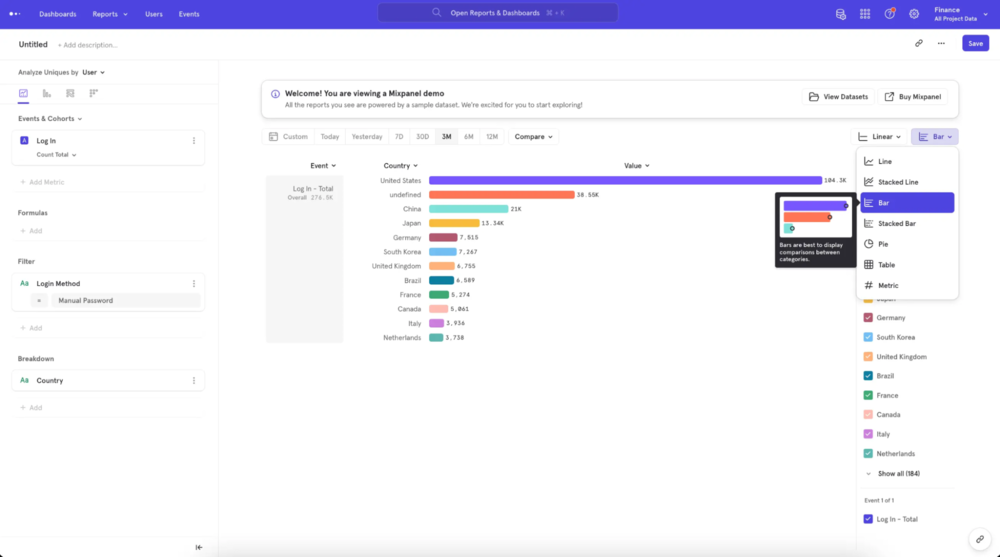 A report example in Mixpanel; source: Mixpanel
A report example in Mixpanel; source: Mixpanel
The platform’s key features include:
- user retention and usage frequency analysis;
- top user paths identification;
- pre-configured analytics templates;
- Spark AI query builder;
- session replays;
- cart analysis;
- custom events;
- campaign reporting;
- multi-touch attribution;
- cohorts of users for behavioral segmentation and analysis.
Pricing. Mixpanel offers a free plan with up to 1 million monthly events, essential analytics tools, and 10,000 monthly session replays. The cheapest paid plan starts at $24/month for 10,000 events and comes with additional features like unlimited reports and cohorts, as well as 20,000 session replays.
Summing up
In summary, there are countless eCommerce tools available, each designed for different purposes. From all-in-one platforms to specialized solutions, you can find everything your business needs. The table below provides a concise overview of every tool mentioned in this post.
| Platfrom |
Best for |
Free plan |
The cheapest plan |
Best feature |
| SendPulse |
All-in-one |
+ |
$8/month |
Multichannel approach |
| Shopify |
– |
$29/month |
Extensive app ecosystem |
| Squarespace |
– |
$16/month |
Visual website builder |
| BigCommerce |
– |
$29/month |
Easy scalability |
| Klaviyo |
Email |
+ |
$20/month |
Omnichannel campaigns |
| Omnisend |
+ |
$16/month |
Conditional content blocks |
| Mailchimp |
+ |
$13/month |
Automated customer journeys |
| HubSpot |
CRM |
+ |
$15/month |
Centralized customer insights |
| Streak CRM |
+ |
$49/month |
Google Workspace integrations |
| Pipedrive |
– |
$14/month |
Customizable pipelines |
| Canva |
Content |
+ |
$10/month per user |
Templates for website and social media |
| Lumen5 |
+ |
$19/month |
AI video creation |
| Figma |
+ |
$15/month per user |
Real-time collaborative design |
| Buffer |
Social media |
+ |
$5/month per channel |
AI content repurpose |
| Hootsuite |
– |
$105/month |
Bulk scheduling |
| Sprout Social |
– |
$199/month per seat |
Influencer campaigns |
| Semrush |
SEO |
– |
$117.33/month |
On-page SEO optimization |
| Ahrefs |
– |
$125/month |
SEO website audit |
| Moz |
– |
$31/month |
Rank tracker |
| ShipStation |
Shipping |
– |
$9.99/month |
Multi-channel shipping |
| Shippo |
+ |
$19/month |
Shipping rules automation |
| Easyship |
+ |
$23/month |
Auto sync orders from platforms |
| Kissmetrics |
Analytics |
– |
$299/month |
Activity and path reports |
| Hotjar |
+ |
$33/month |
Website heatmaps |
| Mixpanel |
+ |
$24/month |
User session replays |
SendPulse offers an all-in-one eCommerce platform that’s both affordable and feature-packed. It enables you to build a website with an integrated online store, analyze its performance, and enhance customer engagement with tools like emails, pop-ups, and chatbots. Try it out today!